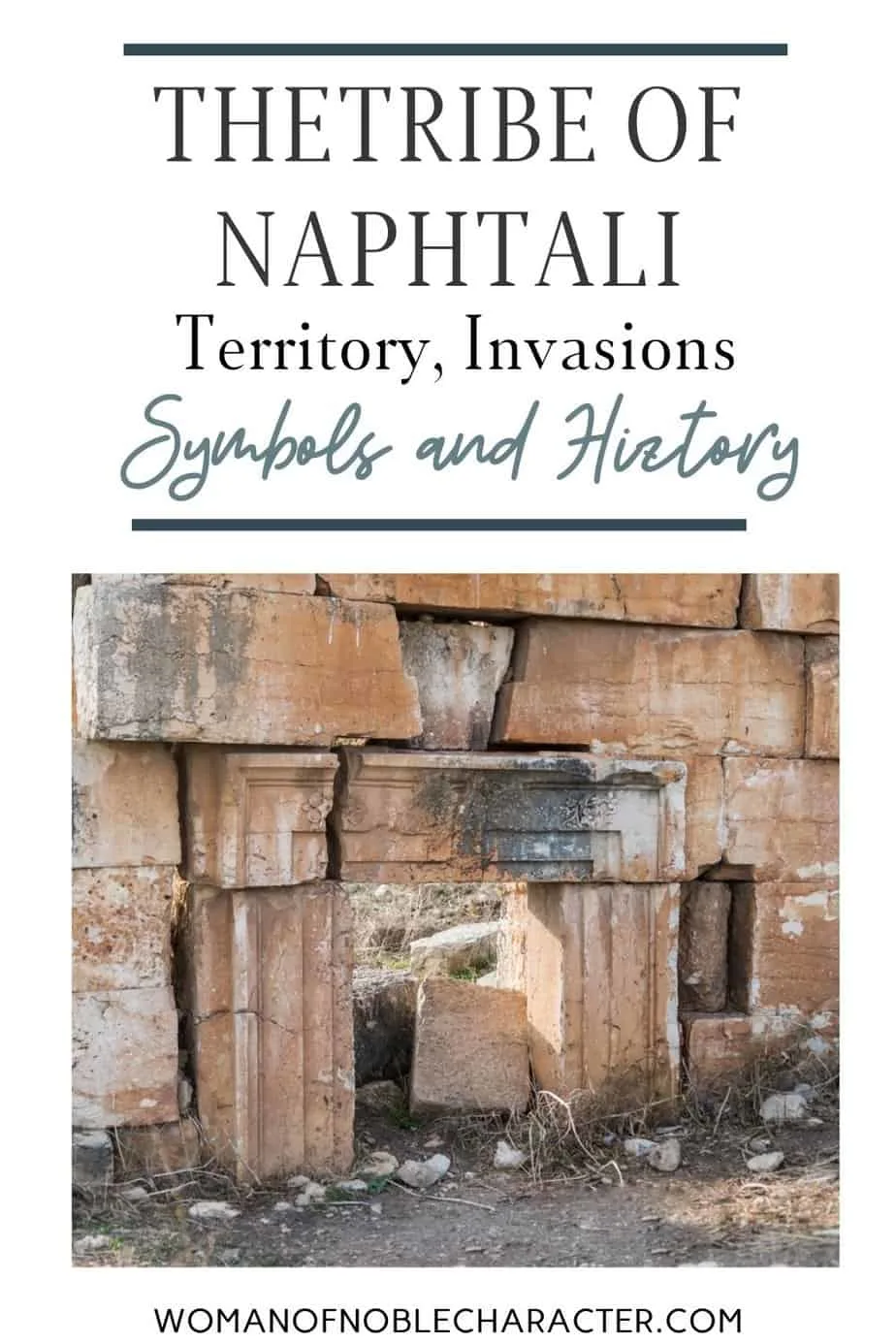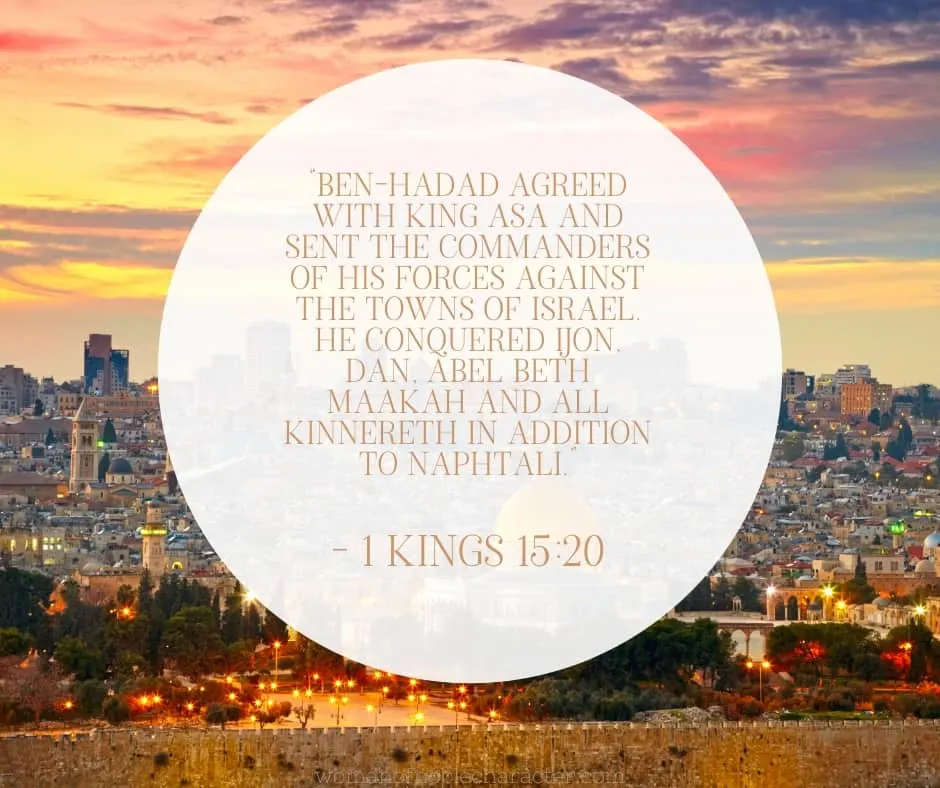This page/post may contain affiliate links. As an Amazon Associate, as well as an affiliate of other programs, this means if you purchase something using these links, I will receive a commission on qualifying purchases at no cost to you! For more detailed information, please visit our Affiliate Disclaimer page
As we continue our series on the Twelve Tribes of Israel, we move to the Tribe of Naphtali. Naphtali is one of the twelve sons of Jacob.
Naphtali was borne by Rachel’s maidservant, Bilhah. He was her second and last child with Jacob.
When Naphtali was born, Rachel declared:
“Then Rachel said, “With mighty wrestlingsI have wrestled with my sister and have prevailed.” So, she called his name Naphtali”.
Genesis 30:8 (ESV)
So, she named him Naphtali.” Naphtali means “my struggle” or “my wrestling.” It may be written as Naphtali or Naphtali and in Hebrew as Naftali or נַפְתָּלִי
In the time of Moses, Naphtali was divided into four clans: the Jahzeelites, the Gunites, the Jezerites, and the Shillemites, named after Naphtali’s sons.

The sons of Naphtali according to their clans: of Jahzeel, the clan of the Jahzeelites; of Guni, the clan of the Gunites; of Jezer, the clan of the Jezerites; of Shillem, the clan of the Shillemites.
Numbers 26:48-49 (ESV)
Naphtali was one of six tribes chosen to stand on Mount Ebal and pronounce curses.
And these shall stand on Mount Ebal for the curse: Reuben, Gad, Asher, Zebulun, Dan, and Naphtali.
Deuteronomy 27:13 (ESV)
By means of these curses, the people promised God they would refrain from certain behaviors.
For example:
- “‘Cursed be anyone who dishonors his father or his mother.’ And all the people shall say, ‘Amen.’
- Deuteronomy 27:16 (ESV)
- ““‘Cursed be anyone who moves his neighbor’s landmark.’ And all the people shall say, ‘Amen.’
- Deuteronomy 27:17 (ESV)
- “‘Cursed be anyone who perverts the justice due to the sojourner, the fatherless, and the widow.’ And all the people shall say, ‘Amen.’
- Deuteronomy 27:19 (ESV)
- ““‘Cursed be anyone who strikes down his neighbor in secret.’ And all the people shall say, ‘Amen.’”
- Deuteronomy 27: 24 (ESV)
- “‘Cursed be anyone who does not confirm the words of this law by doing them.’ And all the people shall say, ‘Amen.’
- Deuteronomy 27: 26 (ESV)
In all, Naphtali helped deliver twelve such admonishments (Deuteronomy 27:15–26).
Jacob and Moses Bless Naphtali
As he did for all of his sons, Jacob gave this blessing to Naphtali:
“Naphtali is a doe set free that bears beautiful fawns.
Genesis 49:21 (ESV)

The last part has also been translated as “he utters beautiful words”.
That means that the tribe of Naphtali will be blessed with outstanding Torah scholars. Moses also blessed the tribe in Deuteronomy. 33:23:
“And of Naphtali he said,
“O Naphtali, sated with favor,
Deuteronomy 33:23 (ESV)
and full of the blessing of the Lord,
possess the lakeand the south.””.
The tribe of Naphtali was blessed by God, but they failed to drive out all the Canaanites living in their territory. For this reason, the descendants lived among their ancient enemies and were forced into hard labor.
Naphtali did not drive out the inhabitants of Beth-shemesh, or the inhabitants of Beth-anath, so they lived among the Canaanites, the inhabitants of the land. Nevertheless, the inhabitants of Beth-shemesh and of Beth-anath became subject to forced labor for them.
Judges 1:33 (ESV)
When the time came for action, Barak responded in fear and cowardice. He agreed to fight against King Jabin’s army only if Deborah would accompany him as his military leader – which she did!
She sent and summoned Barak the son of Abinoam from Kedesh-naphtali and said to him, “Has not the Lord, the God of Israel, commanded you, ‘Go, gather your men at Mount Tabor, taking 10,000 from the people of Naphtali and the people of Zebulun. And I will draw out Sisera, the general of Jabin’s army, to meet you by the river Kishon with his chariots and his troops, and I will give him into your hand’?” Barak said to her, “If you will go with me, I will go, but if you will not go with me, I will not go.” And she said, “I will surely go with you. Nevertheless, the road on which you are going will not lead to your glory, for the Lord will sell Sisera into the hand of a woman.” Then Deborah arose and went with Barak to Kedesh.
Judges 4:6-9 (ESV)
Deborah’s prophecy was fulfilled in Judges 4:17–22.
The Song of Deborah is certainly among the most beautiful writings that the Tribe of Naphtali produced. The Song of Deborah is only second to the Song which Moses and the children of Israel sang after the miraculous crossing of the Red Sea. The Prophetess Deborah is the most famous daughter of the Tribe of Naphtali.
Naphtali was also known as a messenger of good news. He was the first to reach Jacob to bring the good news that Joseph was still alive in Egypt, in addition to quickly running off to Egypt to bring the deed of land title for the Cave of Machpelah to show proof that Esau had sold his burial spot to Jacob. Esau did not want to allow it, claiming that the last free burial spot was his.
Later, Naphtali was summoned by Gideon to repel the Midianites, Amalekites, and others from the East from their encampment in the Jezreel Valley. With the tribes of Asher and Manasseh, Naphtali joined Gideon in battle and pursued the Midianites to Zererah and Meholah.
When the time came for David to assume the throne, the tribe of Naphtali provided 1,000 officers, together with 37,000 armed with shields and spears, along with a caravan of food, to help him.
Of Naphtali 1,000 commanders with whom were 37,000 men armed with shield and spear.
1 Chronicles 12:34 (ESV)
And also, their relatives, from as far as Issachar and Zebulun and Naphtali, came bringing food on donkeys and on camels and on mules and on oxen, abundant provisions of flour, cakes of figs, clusters of raisins, and wine and oil, oxen, and sheep, for there was joy in Israel.
1 Chronicles 12:40 (ESV)
When King Solomon was building the temple, he hired Huram, a man whose mother was a Naphtalite, to do the bronze work on the palace.
1 Kings 7:13-14 (ESV)
And King Solomon sent and brought Hiram from Tyre. He was the son of a widow of the tribe of Naphtali, and his father was a man of Tyre, a worker in bronze. And he was full of wisdom, understanding, and skill for making any work in bronze. He came to King Solomon and did all his work.
The Territory of the Tribe of Naphtali
The approximate location and boundaries of the 12 landed Israelite tribes, are based on records in the Book of Joshua. This, and more, was The Promised Land given by God to the descendants of Israel, the grandson of Abraham. The full extent of the Canaanite land promised was never acquired, due to the repeated disobedience of the Israelites during their commanded conquest of this very idolatrous, heathen land, after the Exodus from slavery in Egypt and the following 40 years of Divine punishment wandering in the wilderness, before Joshua and the living descendants were allowed to enter the land, following the death of Moses. The possession assigned to this tribe is set forth in Joshua. 19:32-39.
The form you have selected does not exist.
The sixth lot came out for the people of Naphtali, for the people of Naphtali, according to their clans. And their boundary ran from Heleph, from the oak in Zaanannim, and Adami-nekeb, and Jabneel, as far as Lakkum, and it ended at the Jordan. Then the boundary turns westward to Aznoth-tabor and goes from there to Hukkok, touching Zebulun at the south and Asher on the west and Judah on the east at the Jordan. The fortified cities are Ziddim, Zer, Hammath, Rakkath, Chinnereth, Adamah, Ramah, Hazor, Kedesh, Edrei, En-hazor, Yiron, Migdal-el, Horem, Beth-anath, and Beth-shemesh—nineteen cities with their villages. This is the inheritance of the tribe of the people of Naphtali according to their clans—the cities with their villages.
Joshua. 19:32-39 (ESV)
It lay in the northeastern corner of the land, bounded on the east by the Jordan and the lakes of Merom and Galilee, and on the north, it extended far into Coele-syria, the valley between the two Lebanon ranges. It included a greater variety of rich and beautiful scenery and of soil and climate than fell to the lot of any other tribe.
The territory of Naphtali extended to about 800 square miles, double of that of Issachar. The region around Kedesh, one of its towns, was originally called Galil, a name that was afterward given to the whole northern division of Canaan. A large number of foreigners settled here among the mountains, and therefore it was called “Galilee of the Gentiles”
““The land of Zebulun and the land of Naphtali,
Matthew 4:15-16 (ESV)
the way of the sea, beyond the Jordan, Galilee of the Gentiles—
the people dwelling in darkness
have seen a great light,
and for those dwelling in the region and shadow of death,
on them a light has dawned.”
The southern portion of Naphtali has been called the “Garden of Palestine.” It was of unparallel fertility. It was the principal scene of Jesus’ public ministry. Here most of his parables were spoken, and his miracles performed.
At the time of the Exodus, The Tribe of Naphtali numbered 53,400 adult males (Numbers 1:43), but, at the close of the wanderings, they numbered only 45,400 (26:48-50).
Along with Dan and Asher, they formed “the camp of Dan,” under a common standard (2:25-31), occupying a place during the march on the north side of the tabernacle.
The Tribe of Naphtali is Invaded
Naphtali was the first tribe to be invaded by Benhadad, king of Syria, in the reigns of Baasha, king of Israel, and Asa, king of Judah.
“And Ben-hadad listened to King Asa and sent the commanders of his armies against the cities of Israel and conquered Ijon, Dan, Abel-beth-maacah, and all Chinneroth, with all the land of Naphtali.”
1 Kings 15:20 (ESV)

(and in 2 Chronicles 16:4).
the reign of Pekah, king of Israel, the Assyrians under Tiglath-pileser swept over the whole north of Israel and carried the people into captivity. And thus, the kingdom of Israel came to an end. This occurred around B.C. 722.
“In the days of Pekah king of Israel, Tiglath-pileser king of Assyria came and captured Ijon, Abel-beth-maacah, Janoah, Kedesh, Hazor, Gilead, and Galilee, all the land of Naphtali, and he carried the people captive to Assyria.”
2 Kings 15:29 (ESV)
Later, Naphtali became almost entirely a desert. The town of Tiberias, on the shore of the Lake of Galilee, and Safed are the only places in it of any importance. The Midrash (an ancient commentary on part of the Hebrew scriptures, attached to the biblical text. The earliest Midrashim come from the 2nd century AD, although much of their content is older.) expands on the Sea of Galilee and its relationship to the tribe of Naphtali:
The people of the tribe of Naphtali earned God’s blessings in the fullest measure because their conduct was in fullest compliance with God’s will. Their reward will be both in the World to Come (which is likened to the “sea”), as well as in this present world (likened to “land”). The sea is a vast area covered by water; we cannot see what’s going on in the sea. But on land, we can see everything. Similarly, the World to Come is called the “Hidden World,” while the present world, the “here and now,” is called the “Revealed World.”
More importantly: When a person is about to make a sea voyage, he must provide himself with all the necessary needs for his long voyage, since on high seas, there is nothing, he can buy; only on land, before he sets out to sea, can he obtain all his necessities. Similarly, the Torah teaches us this world is where a person prepares for the Eternal World, the World To Come (Olam Habba), and the only things that count in the Eternal World are the eternal values a person acquires in this world. (overview from Jewish Encyclopedia)
The people of Naphtali had their ups and downs. They included shades of obedience, and cowardice, but also bravery under Gideon as well as godly support for King David that we can learn from in this passage about them – God exalts those who are humble!
Naphtali (as part of Galilee) was despised, and Nazareth was considered the lowest of the low. Yet Nazareth was Jesus’ hometown, and Galilee was exactly where Jesus chose to begin His ministry.
For our sake, He became “despised and rejected by men.” The King of kings had the humblest beginning. He is truly “humble (lowly) in heart.”
He was despised and rejected by men,
Isaiah 53:3 (ESV)
a man of sorrows and acquainted with grief;
and as one from whom men hide their faces
he was despised, and we esteemed him not.
Take my yoke upon you, and learn from me, for I am gentle and lowly in heart, and you will find rest for your souls.
Matthew 11:29 (ESV)
Tribal Symbols of Naphtali
- The traditional symbols for Naphtali include the deer, hind, gazelle, or stag, and sometimes features a fruit basket.
- The Gemstone for Naphtali is an Amethyst (Akhlama), which is purple. For the flag banner it is a light red color.
- The tribe’s color is deep red or burgundy.
- Naphtali is the tribe associated with the Hebrew month Adar.
- Jacob’s last words to his son, Naphtali, were “Naphtali is a doe let loose that bears beautiful fawns.” Naphtali was to be agile and nimble. Because of this, Naphtali is represented by the family of deer that stands on a mound of stone.
You may enjoy this sermon on the Tribe of Naphtali by Pastor Omar Thibeaux.
For deeper study on the Tribe of Naphtali, consider one of these recommended resources:
The 12 Tribes of Israel (or is it 14?) & Lessons We Can Learn by Susan J Nelson
The Ten Lost Tribes: The History and Mystery of the Lost Tribes of Israel by Charles River Editors
The Study of The Twelve Tribes of Israel by Rev. Derrick A Hill
Did you learn something new about this tribe of Israel, the Tribe of Naphtali? I’d love to know. Please share in the comments below.
For the Tribe of Judah, see this post.
Because of Him,
Sue
ESV – “Scripture quotations are from The ESV® Bible (The Holy Bible, English Standard Version®), copyright © 2001 by Crossway, a publishing ministry of Good News Publishers. Used by permission. All rights reserved.”

